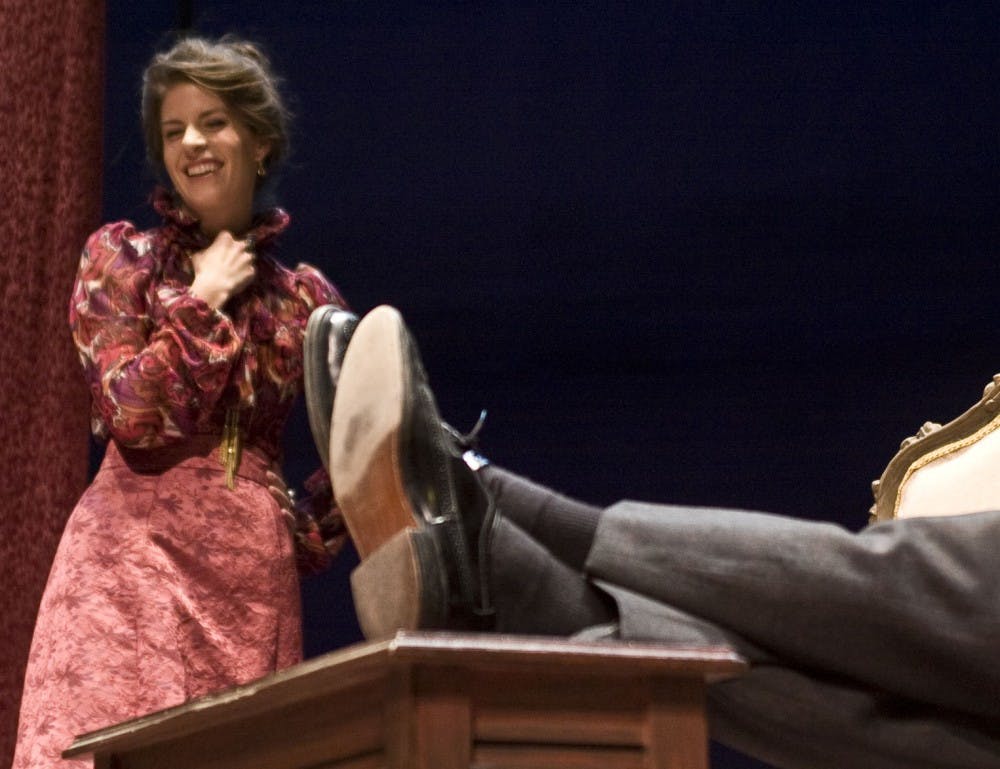Anton Chekhov’s “The Cherry Orchard” is the best play UNM has put on in months.
It’s something that everyone can enjoy, not just someone who likes theater. Anyone who loves visual or auditory creation in music, film and art will appreciate something.
Chekhov, a Russian playwright, wrote mainly in the latter half of the 19th century. “The Cherry Orchard” was his last work, premiering at the onset of the new century with the new politics to go along with it.
The plot deals with an aristocratic family forced to sell its family estate to pay debts. Scholars and amateurs admire Chekhov for his cultural significance and literary impact, but there is something alluring about this particular piece.
There are no villains in this play — not in the classical good vs. evil sense.
The aristocracy falls because of generosity and human mistakes. The lower class’ financial rise is void of meaning, despite being a technical victory.
An army of dedicated technical staffers put in hundreds of hours to make “The Cherry Orchard” a wonder to watch.
Every costume is breathtaking and detailed. The four acts take place in different, distinctive settings.
In one scene, ghostly, hanging chandeliers give way to heaps of soil strewn across the stage for another. Even the orchard trees showcase the magnificent design as something to be appreciated all on its own. Lighting and sound are top notch, subtle, chilling and masterfully executed.
This is the “rich theater,” but it’s the “rich theater” done well.
This is what happens when a play has a budget, and luckily it’s used well.
Expert details litter the play’s design, among which include an actual dog playing the family pet Orlov (Bear), and most praiseworthy, a live band. A group of gypsy-ish, folk musicians from the Nahalat Shalom Community Klezmer Band get stage time and elevate the show.
This is certainly true of all plays: Live music in a live performance gives theater its inherent personal humanity that something stagnant like film lacks.
Much of the acting isn’t quite in step with the rest of the show. In general, the women have a better handle on things than the men. There are problems with upstaging, and most of the actors can be separated into those who sound like they’re reading off a piece of paper and those who don’t.
In particular, Andrew Leith plays Yasha, a cigar-smoking, lady-killing slimeball, and he does much with few lines.
Ida Dorthea Vethe plays Carlotta, a charmingly weird, bohemian governess who always delights and is given comedic bits that snatch the spotlight.
The two main performances by the lady of the estate, (Lauren Dusek Albonico) and the entrepreneurial man of tomorrow (Nick Salyer) are nuanced and enjoyable, but leave you wanting more. Albonico instinctively speaks with her hands.
Most of the time you care about her predicament and feel for her problems, but her dramatic delivery sometimes makes it easy to remember you’re watching a play.
On the same hand, Salyer has great instincts as a performer, but his movements are erratic in a way that seems uncontrolled.
“The Cherry Orchard” has been around 100 years, and with a performance lineage like this, its impact will be everlasting.
Get content from The Daily Lobo delivered to your inbox






